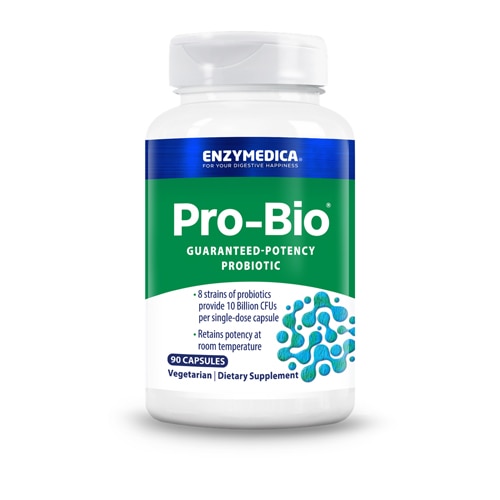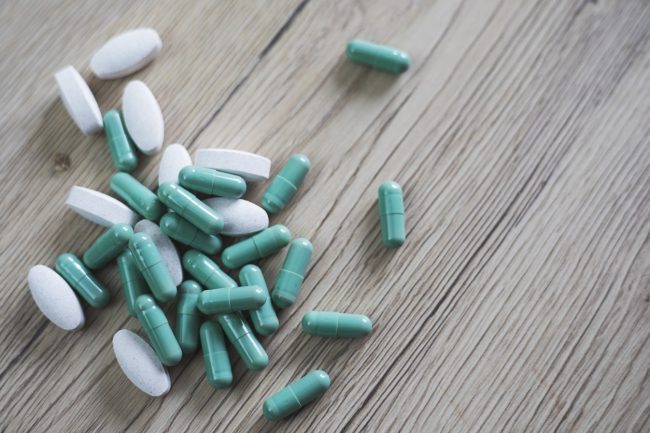Digestive enzymes vs. probiotics. Both are important to our digestive health, and both reside within our digestive system and help us stay well. But what’s the difference between digestive enzymes and probiotics?
Often, these products are marketed to help similar digestive issues when, in fact, they perform different functions in the body. For one, enzymes are proteins and probiotics are live organisms. That means enzymes can actually digest food and are effective at relieving common issues, including occasional gas, bloating, indigestion, heartburn and general discomfort. Probiotics, on the other hand, are useful in supporting overall health of the gastrointestinal tract as well as helping to support our immune system and the health of other body systems.
But there’s more to it than that. Let’s take a closer look at each of these nutrients and their role in your health.
Digestive enzymes vs. metabolic enzymes
Enzymes are created within the body, as well as absorbed from food or supplemental sources. They are proteins made up of amino acids. All enzymes power different life functions, but they mainly serve digestive and metabolic activities.
The benefits of digestive enzymes include the breaking of chemical bonds in food to reduce the size of food particles. They are produced in response to the presence of food, thus digestive enzymes can be found throughout the digestive system – from the mouth to the large intestine.
Metabolic enzymes primarily do the opposite and are involved in building molecules. However, metabolic enzymes also help break down certain molecules for bodily functions. These enzymes are produced in every cell of the body and support everything from energy production to all specialized functions of a cell – whether in the brain, liver, heart or part of the immune system.
Fast fact: Metabolic enzymes are too large to be absorbed intact and cannot be added through diet or supplements.
Digestion requires energy
Your body spends energy creating enzymes, but enzymes will do their assigned job until they run out of their own energy. Enzymes have very specific jobs, because each enzyme breaks down different types of foods. For example, protease breaks down proteins and lactase breaks down dairy. The hundreds of different enzymes are categorized based on what exactly they digest.
Digestion can take up to 80% of your body’s energy, leaving only 20% left for metabolic enzymes that support every other function, such as immune health. The more your body needs to work at digestion, fewer metabolic enzymes are being produced to power the rest of your body. That’s why you may feel tired after eating a big meal. The more energy put toward digestion, the less energy you have for other functions.
Dr. Murray tip: This system also works in reverse. If your body is having an occasional metabolic challenge, more energy will be put into producing those enzymes and fewer enzymes will be produced for digestion. With fewer digestive enzymes, you may experience digestive discomforts.
Missing or deficient enzymes can contribute to digestive discomforts like occasional gas, bloating or heartburn. The most common types of enzyme deficiencies presents as food intolerances. Being food intolerant means your body may not digest specific types of food as well as it should due to a missing enzyme. For example, lactose intolerance is the result of the body not having enough lactase to digest the dairy sugar known as lactose. If you think you’re experiencing an enzyme deficiency, look for supplements with that specific enzyme.
How can you get more enzymes?
You can get sufficient amounts of enzymes by incorporating more raw foods into your diet. Raw foods are rich in enzymes that would otherwise be lost during the cooking process. Cooking and processing foods breaks down the enzymes, meaning your body must then produce all the necessary digestive enzymes. Since raw foods contain active enzymes, your body will spend less energy digesting them. However, raw foods only contain the enzymes needed to break down that specific food and typically no, or limited, additional enzymes.
One of the best ways to increase your digestive enzymes is by adding a natural enzyme supplement. I prefer fungal-based enzymes over animal sources, whenever possible. The best general digestive enzyme formulas contain a blend of all the enzyme categories – protease, lipase, amylase and cellulase. You also want to look for a formula that works at different pH levels throughout the digestive system.
Dr. Murray’s enzyme recommendation: Enzymedica Digest Gold with ATPro™ features plant-based enzymes approved for a vegetarian or vegan diet.
What are probiotics?
Probiotics are bacterial organisms that live within your digestive system. You do have bacteria that are naturally found in the body, and these are referred to as part of your “microbiome.” Probiotics cannot be made by the body, so they must be added through supplements and diet. Their livelihood can be greatly influenced by your environment. Maintaining a good colony of probiotics can help support the enzymes your body produces. But the two main functions of probiotics are supporting your digestive and immune health.
Probiotics are essential for supporting immune health, because the majority of the immune system (up to 75%) is found within the digestive tract. If your digestive system is functioning optimally, it will be easier to maintain a healthy immune system as well. In addition, probiotics are helpful in increasing immunity cells and maintaining the function of the immune system.
Probiotics are also useful in supporting digestive health through regularity. Probiotics are another reason why one of my core beliefs is that natural digestive health is essential for total body wellness.
Fast fact: Probiotics also help the body produce and absorb vitamins and minerals!
There are billions of different probiotic bacteria living in the digestive system. This balance of bacteria is what allows your digestion and immunity to run smoothly, while an imbalance may cause seasonal challenges.
How can you get more probiotics?
Since our bodies cannot produce these essential bacteria, it is up to us to make sure we are maintaining a healthy flora of good bacteria. One way is to try more fermented food recipes. Foods like yogurt, kefir, sauerkraut and kimchi are rich in probiotics, because the fermentation process gives probiotics the optimal environment to grow. Some other great probiotic foods include natto, kombucha and tempeh.
Another way to increase your probiotic intake is through probiotic supplements. Most probiotic supplements measure their amount of bacteria in CFUs, or Colony Forming Units. Look for a formula that contains a variety of different probiotic strains rather than a formula that has billions of just a few bacteria. By using a supplement with a variety of strains, you’re more likely to target the bacteria your digestive system needs, since each strain does something different for your body. The most popular families of probiotics are Lactobacillus and Bifidobacterium.
Probiotics are living bacteria, which means there are a few key things to look out for when picking probiotic supplements. Make sure the bottle is protected from light through a solid bottle or cardboard box packaging. These live organisms can be degraded by too much exposure to light, so it’s important they are protected. Many probiotics must also be refrigerated to keep the bacteria alive, but there are some shelf-stable formulas available, as well.
Dr. Murray’s recommendation: Enzymedica Pro-Bio™ provides 8 different strains and guaranteed potency of 10 billion CFUs.
Should I be taking enzymes or probiotics?
Actually, you can take both! Enzymes and probiotics are both essential for your digestive health and total body wellness. Enzymes and probiotics work well together to help alleviate occasional gas, bloating and discomfort. And after consulting your doctor, you can begin to feel relief. Look for a formula that blends together a variety of digestive enzymes and probiotics and is active across the pH levels of the digestive system.
Dr. Murray’s recommendation: Enzymedica Digest Gold™ + Probiotics is a non-GMO, vegetarian formula with an advanced enzyme formula for the breakdown of carbs, fats, protein and fiber.
When it comes to digestive enzymes vs. probiotics, here’s a snapshot of their differences:
- Enzymes are biologically active proteins, while probiotics are living bacterial organisms.
- Enzymes are present throughout the body while probiotics are concentrated in the digestive system.
- Enzymes can be naturally produced in the body but probiotics cannot.
- Enzymes are the energy for all life functions and can be produced by probiotics as their food source.
- Both work in the digestive system and support immune health, but enzymes also work in the metabolic processes in the body.
- Both can be incorporated into your diet. Look for raw foods rich in enzymes, and opt for fermented foods thriving with probiotics.
- Both enzymes and probiotics can be added through natural supplements.




